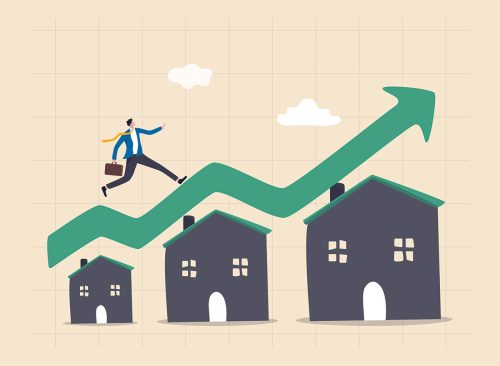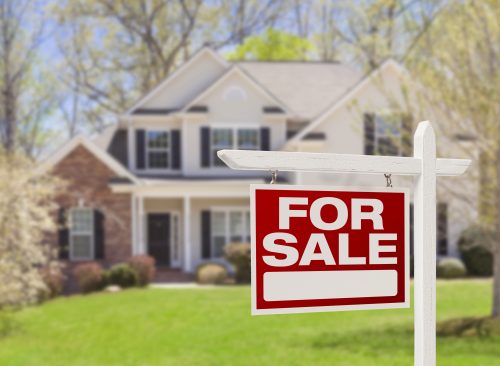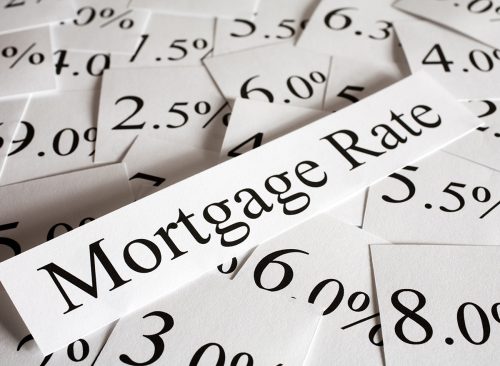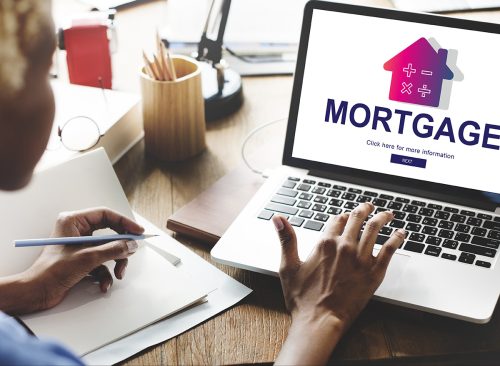Home Prices Are Hitting New Highs: 10 Things Sellers and Buyers Need to Know
“There is no doubt that the housing market has reignited."

It's not news that home prices hit new highs during the COVID pandemic, as construction stalled and supply-chain issues drove down inventory of the places where people suddenly had to be all the time. But what may be surprising to home buyers is that despite relatively high interest rates, and well into the post-pandemic era, home prices hit a record high in May. "The sharp jump in mortgage interest rates last year threw cold water on an overheated housing market, but it didn't last long. Even with rates still high, home prices are now gaining again, and the gains are accelerating with each new month," CNBC reported Monday. "There is no doubt that the housing market has reignited from a home price perspective," Andy Walden, vice president of enterprise research at Black Knight, told the news outlet. If you're looking to buy or sell a home, these are 10 things experts say you need to know.

"Prices began dropping last summer, after the average interest rate on the 30-year fixed-rate mortgage more than doubled in just six months. They continued to fall until January, when buyer demand returned but came up against very tight supply. Buyers may have simply gotten used to higher rates," CNBC reports.

Supply is tightening because of the last year's movement on interest rates. New listings are down about 25% from a year ago, because people who financed homes at mortgage rates below 4% aren't eager to sell their homes and pay higher rates on another. Total inventory is now about half of what it was just before the pandemic.

"Earlier this year I shared that I believed 6% mortgage rates were accepted as the new normal. I think now we're in an environment where 7% mortgage rates are now the new normal, and people are accepting it," Robert Reffkin, CEO of Compass Real Estate, said last week on CNBC.

Although home prices are still lower in the West and in many cities considered pandemic "boom towns"—where remote workers flocked during the COVID era's early days—those prices "are starting to firm up," CNBC reports. Homes in San Jose, California, lost 10% of their value last year, but inventory is starting to tighten, and prices are rising. They were the No. 2 biggest gainers in the country in May. Tech hubs San Diego, Los Angeles, San Francisco, and Seattle also saw price growth that month.

In Austin, one of the biggest pandemic boom towns, home inventory "continues to run above pre-pandemic levels, putting downward pressure on prices, which have fallen to -13.8% below peak, the largest gap of any market. Just eight of the top 50 markets are currently more than 5% below their 2022 peaks," Walden told CNBC.

The median price of a pre-owned home in May was $396,100, according to the National Association of Realtors (NAR). The median down payment is about 13%. Experts say homes are now selling for slightly above their listing price, on average, for the first time in a year.

Many first-time buyers can still buy a home with less than 5% down, Lawrence Yun, chief economist at NAR, told CNN on May 11. "Most homebuyers, especially those who are both selling and buying an upgraded home at the same time, are still putting down 20% or more because they have proceeds [from the previous sale], but first-timers can put as low as 3.5% or even 0% down so long as they're willing to stay within their budget," he said.

"With credit card debt the highest it's ever been, we're seeing move-up buyers who no longer qualify for the mortgages they need to buy a larger home or upgrade to a better neighborhood," Elena Sordo-King, senior vice president at First Bank, told CNN in May.Student loan debt—which now averages $37,000—can automatically disqualify many prospective first-time home buyers, experts say.

"If I were to line up people who purchased homes in the 1980s and 1990s, when loans had rates in the double digits, and ask them if they made the right decision, most would say it was one of their best financial decisions ever," Yun told CNN. "That's because there's a steady buildup of wealth that occurs from homeownership, plus you can always refinance when rates decline."

Interest rates will likely come down in the 24 to 36 months, experts say. "Two or three years from now, my guess is that we won't be in the same position," said Sordo-King. "Interest rates will likely fluctuate down, but it will ebb and flow, so the important question is, can you handle that payment for the next 34 to 46 months?" "As they say, you date the rate, but marry the home," she added.














